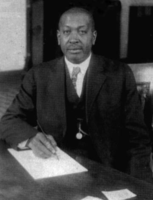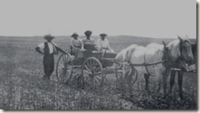This Colorado site could become a national park honoring Black history: Why Dearfield matters
- Oops!Something went wrong.Please try again later.
U.S. senators and representatives from Colorado are pushing the National Park Service to designate the Dearfield Homestead within the National Park System to preserve Black American history.
The Dearfield Homestead in Weld County was a prominent agricultural settlement that promoted Black land ownership and economic independence after the Reconstruction era and before the Civil Rights Movement during the 1910s to 1920s.
Now, Democratic Sens. John Hickenlooper and Michael Bennet, Republican Rep. Ken Buck, and Democratic Reps. Joe Neguse and Jason Crow want Dearfield to be recognized as a national park.
Dearfield's history
Dearfield is located in Weld County along U.S. Highway 34, 11 miles west of Wiggins and about 25 miles east of Greeley.
Dearfield grew to become a profitable settlement, enabled by a succession of homesteading legislation and rooted in the practices of dryland farming. Dearfield produced significant marketable crops and became home to as many as 300 residents during its peak around 1915. At its peak, the townsite also boasted several churches, a school, dance hall, blacksmith shop, grocery and other businesses.
The settlement was inspired by American historical figure Booker T. Washinton's African American self-help movement.
Despite Dearfield's successes, the Great Depression and Dust Bowl ultimately led to its downfall. Today, only two original buildings remain in the former townsite area: a filling station and the Jackson residence. The main street alignment, historic building ruins and numerous archeological resources also remain.
In 1995, Dearfield was listed on the National Register of Historic Places for its representation of the African American colonization movement and association with leader and entrepreneur Oliver Toussaint Jackson.

Marcie Moore Gantz, director of the state historical fund at History Colorado, said making Dearfield a national park would carry significant implications for Coloradans, especially for the families whose ancestors lived there and for younger generations.
"It recognizes how important the African American diaspora has been in the history of moving West. It gives credit to the hard work and contributions of the people who lived there, allowing us to remember and honor their struggles," Gantz said.
Gantz said the original site is a testament to the resilience and contributions of the Dearfield homesteaders and offers a living archive of their endeavors during a time when African Americans sought economic independence through land ownership.
"Despite facing racism and discrimination, these homesteaders shared experiences with all pioneers heading West, including challenges with drought, a harsh farming environment, and isolation from family and friends back east," she said.
Gantz explained that although Dearfield is already a protected site, turning Dearfield into a national park will provide a dynamic platform for learning and will inspire a deeper connection to Colorado's collective history and the different stories that shape what Colorado is today.
What are the National Park Service's qualifications?
The National Park Service is currently conducting a special resource study of Dearfield to identify whether it meets criteria to be included as a unit of the National Park System. The study was authorized by the Consolidated Appropriations Act of 2023 and signed into law by President Joe Biden on Dec. 29, 2022. The legislation provides a three-year time frame to complete the study on Dearfield.
According to the park service, to be included in the National Park System, the recommended area must include national significance, suitability, feasibility and the need for park service management.
If the study finds that Dearfield does not meet one or more of the criteria, the study process will be curtailed.
Regardless of the outcome of the study, new units of the National Park System can only be established by an act of Congress or by presidential proclamation.
More: 8 things to do this Black History Month in Fort Collins
Congressional support of Dearfield
Hickenlooper, Bennet, Buck, Neguse and Crow sent a bipartisan letter to National Park Service Director Charles Sams urging the consideration of Dearfield's inclusion within the National Park System.
That letter says, in part:
"Dearfield was a thriving agricultural community until the hardships brought on by the Dust Bowl and the Great Depression led many residents to leave. Today, a gas station, diner, and Dearfield founder Oliver Toussaint Jackson’s home — which was placed on the National Register of Historic Places in 1995 — remain standing. But even with these few remaining tangible reminders of their legacy, the settlers of Dearfield authored an important chapter of Colorado’s history, and by preserving this site for future generations we can continue to honor them."
The full letter is available to read here.
Dearfield's significance today
Gantz described Dearfield's potential recognition by the park service as being a profound acknowledgment of American history, especially in a place like Colorado, which pioneered a new life for numerous minorities, including Black Americans.
"In a landscape where only about a dozen national parks or historic sites are dedicated to this history, with a focus on slavery or the Civil Rights Movement, Dearfield stands out," Gantz said. "This recognition cements animportant chapter in its history, going beyond the usual narrative and deeply connecting it to our shared identity and culture in Colorado. In doing so, it adds a significant thread to the broader tapestry of American history."

Whether the park service selects Dearfield to usher into the National Park System, Gantz believes Dearfield is an ongoing story with narratives yet to be uncovered.
"The commitment to preserving Dearfield extends beyond physical structures; it involves engaging with descendants to ensure their voices are heard," she said.The National Park Service is currently accepting public comment for its study on Dearfield through Feb. 23. Interested parties, stakeholders, scholars and the general public are encouraged to inform the study by helping the study team understand the significance of Dearfield, what makes it unique, how much support is possible, and if there are any issues or concerns that should be addressed in the study process.
Click here to provide a public comment on the Dearfield study.
To take a deeper dive into Dearfield's history, click here to listen to History Colorado's The Lost Highways podcast episode, "The Dearest Field".
This article originally appeared on Fort Collins Coloradoan: Why Dearfield Homestead in Colorado could become a national park
